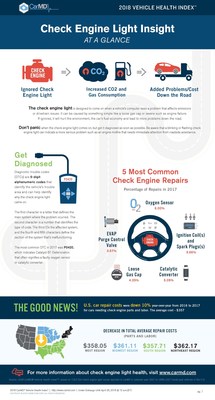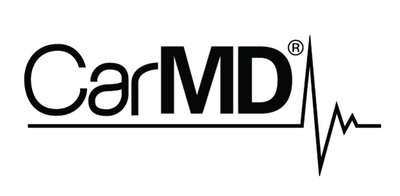TMCnet News
2018 CarMD® Vehicle Health Index™ Reveals U.S. Check Engine-Based Vehicle Repair Costs Are Down 10 PercentIRVINE, Calif., April 24, 2018 /PRNewswire/ -- CarMD, a leading provider of automotive diagnostic business solutions and data licensing, today released its nationally known 2018 CarMD® Vehicle Health Index™ (VHI) report. This VHI report provides an overview of information related to check engine-related car repairs, costs and auto care trends.
The report revealed that the average cost to repair a check engine light-based incident fell 10 percent year-over-year in 2017. This is comprised of a 13 percent dip in labor charges and an 8 percent reduction in parts costs based on the vehicles inspected. The report also found that a faulty oxygen sensor, which negatively impacts fuel economy if left unrepaired, remains the most common reason vehicles experience a check engine light. CarMD further found that vehicle age impacts the type, cost and frequency of repairs, with a loose gas cap most likely to trigger a check engine light on a model year 2017 vehicle, while faulty ignition coils are most common on 2007 vehicles. "We are encouraged by the drop in check engine light repair costs and a lower percentage of costly catastrophic repairs, which is an indication that drivers across the country are taking car maintenance and check engine light repairs seriously and vehicles are becoming more reliable," said David Rich, CarMD's Technical Director. "As the summer driving season approaches and gas prices inch past $3.00 per gallon, CarMD reminds vehicle owners that when the check engine light is on, even if your car seems to be driving fine, it will suffer from reduced fuel economy. It's important to have it looked at as soon as possible – especially if the check engine light is blinking, which can indicate a serious problem." Vehicle owners can access CarMD Garage, a free online service to see upcoming maintenance services due, at www.carmd.com/garage. CarMD found that the average cost to repair a check engine problem in the U.S. in 2017 was $357 including parts ($216) and labor ($141), which is down 15 percent from its $422 high in 2006 but still 7 percent above the 10-year low of $334 in 2011. The five most common problems found to trigger the check engine light were 1) oxygen sensor, 2) ignition coil and spark plug, 3) catalytic converter, 4) loose or damaged fuel cap and 5) EVAP purge control valve. They range in cost from $26 to replace an OE gas cap to $1,271 on average for a new OE catalytic converter. Car repairs and associated costs can be affected by region, maintenance decisions of previous owners, the time it takes for the automotive technician to perform the repairs, as well as the vehicle's age. The 2018 CarMD Vehicle Health Index analyzed repairs needed on 7,167,314 in-use vehicles reported to and validated by CarMD's network from Jan. 1, 2017 to Dec. 31, 2017. The full Index, including the 10 most common check engine-related repairs, 10-year history of U.S. car repair costs, list of most common repairs by region, and 10 least/most expensive repairs is available at https://www.carmd.com/wp/vehicle-health-index-introduction/2018-carmd-vehicle-health-index/. Below are highlights from this year's report: - According to CarMD, during 2017 the following were the five most common check engine light-related car repairs and associated average repair costs, including parts and labor, on 1996 to 2017 model year vehicles. If left unrepaired, each can negatively impact fuel economy and harm the environment.
- The type and frequency of fix affects the average cost to repair.
- Vehicle age affects the likelihood and type of check engine light repair incidents.
Click here to view the detailed 2018 CarMD® Vehicle Health Index™ report. For additional information, including customizable reports, contact [email protected] or visit this link: https://www.carmd.com/wp/vehicle-data-services/. About CarMD
SOURCE CarMD 
|


